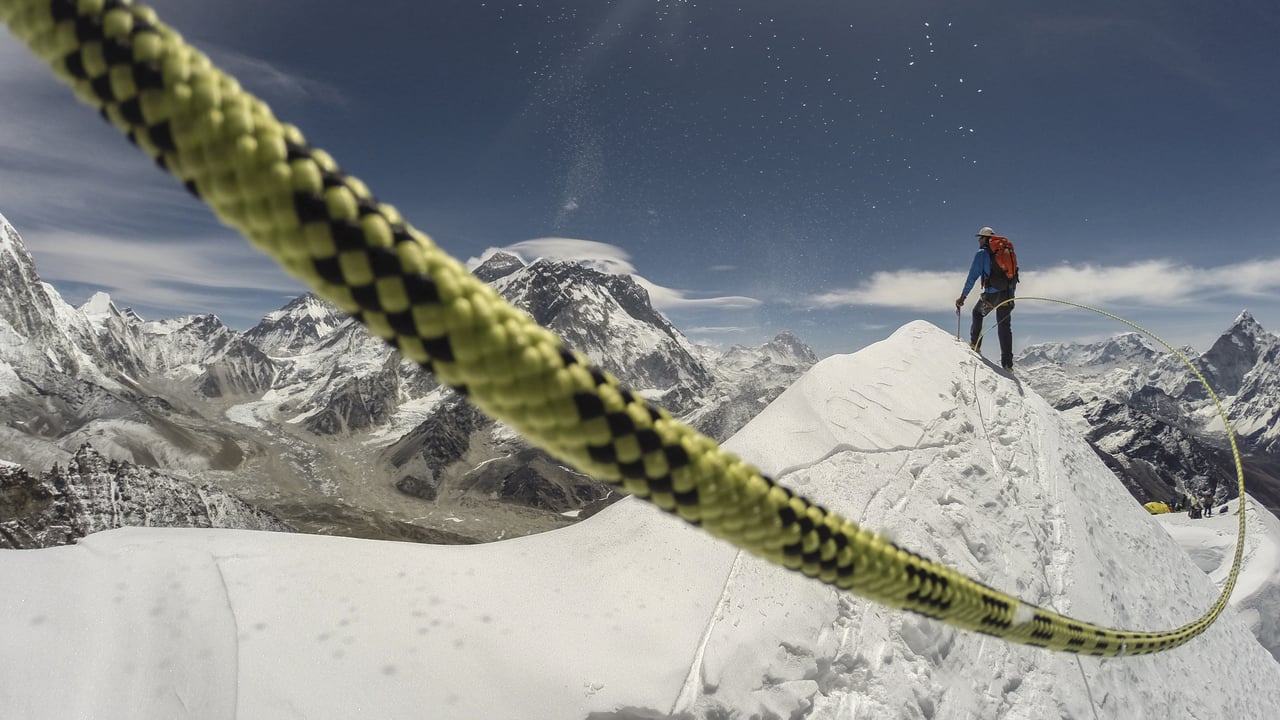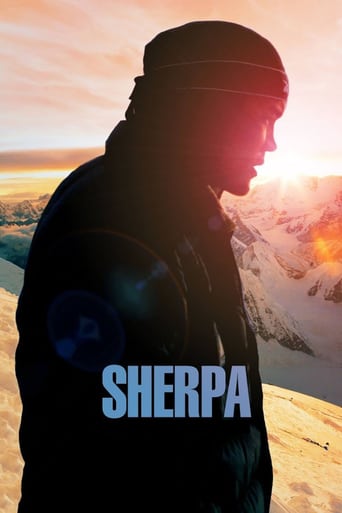



Memorable, crazy movie
Good movie but grossly overrated
This is one of the few movies I've ever seen where the whole audience broke into spontaneous, loud applause a third of the way in.
View MoreIt’s not bad or unwatchable but despite the amplitude of the spectacle, the end result is underwhelming.
View MoreThese westerners should be ashamed of themselves for their exploitation of the locals, and in taking recognition as Mt. Everest climber. They did not climb the mountain by themselves, but rather with the bulk of the hard work was done for them by the Sherpas. The ONLY reason they were able to summit is because of the Sherpas' efforts. This is a rich men's game, and these climbers are usually millionaires (and more) or with extremely rich sponsors.The government of Nepal should be ashamed of themselves as well; not only for what they do to their own people, but also what they allow to happen in this mountain with the man-made destruction of this beautiful natural environment. These climbing operations and their climbers leave countless of oxygen bottles, climbing equipment, tools, garbage, non-degradable trash, human excrement, etc. on this mountain. Almost all of these trash and garbage will remain there forever because of the preservation characteristic of extreme cold temperature. There are efforts to retrieve these refuses, but only as symbolic attempts at best with no real solutions to make a difference.I have no respect for those people who do extreme sports (or extreme of anything). In their quests of accomplishing their goals, they always have to destroy or harm something else with much more devastating impacts (whether it's the environment, the animals, their competitors, their societies, their communities, their families... or even themselves). They are just like those bad auto mechanics who fixed the brakes, but allowed the tires to detach down the road, or those plumbers who unclogged the toilet, but caused the toilet water leakage in the process.I propose a complete ban of Mt. Everest climbing for 10 years or until when all the man-made objects/trash completely be removed from this mountain. Once it's allowed to be climbed again, all climbers must carry their own supplies and equipment beyond base camp, that means Sherpas can only help climbers and transport their cargoes up to base camp (no more 30-trip climbing for each Sherpa and no more laying down ropes and tracks for climbers from base camp to summit; and, ANYTHING taken up must be brought down each climbing season. This rule alone will cut down a huge number of rich/part-time/amateur climbers and their share of the destruction of Mt. Everest. Last but not least important issue: past and present Sherpas are to be recognized for their summits in the history books/records just like their westerner counterparts. Sherpas are to be recognized as professional mountaineers at the national and international level with their salaries/benefits shall be commensurate with their experience and years in service.
View MoreAs just a documentary, the film is beautifully produced. Unfortunately, I had a very hard time trying to find a good version to watch. I suspect there is a lot of pressure to keep this out of public view. If I recall in the doc they said that climbers typically pay 70k and upward to attempt the climb and it's a 350 million dollar (?) enterprise to the nepalese. So this is a major industry in nepal that certainly a lot of people do not want to upset. Very well photographed and edited and remarkably candid interviews. While I was watching this I wondered if the owners and the climbers actually believed what they were saying. I mean in one interview a climber actually likened the sherpas to terrorists and 9/11. I was astonished that there were so many they interviewed that had a similar view. Okay so you pay 70-100k to climb but the sherpas, at least according to the doc, see very little of this money but enjoy the most risks out of those making money off the enterprise. Unfortunately the doc is very sketchy about the overall economy of the operation but probably because it's most suitable in the written word. If anyone knows if this has been documented please post. That is, it would be interesting to see how the money gets distributed to the operators, nepalese government, local businesses, and the sherpas. And the film never quite explained how the losses are handled or if the operators or their clients have insurance to cover certain events. Anyway, the climbers pay a lot of money and then expect the sherpas, come 'hell or high water' to perform despite any disasters or risks involved. Sorry but I have no sympathy for the two climbers who attempted twice but were denied when their seasons were both shut down prematurely. Lucky for them they have the money to spend on such things. Personally I'd feel lucky just to afford to get to the base camp. But, using other people, even if absolutely necessary, to reach your personal goals, considering the risks involved, deserves appropriate compensation not exploitation, and an appreciation for individual choice. Anything else shows tremendous lack of wisdom and compassion.
View MoreIsn't that grand?Russell Brice, the New Zealand owner of Himalayan Experience, is the sort of person one would cross the street simply to kick in the shins (or worse).His attitude towards the Sherpa is, at best, patronizing. He calls them "boys", and insists their unhappiness has been provoked by outside agitators. (One is surprised he doesn't say "Communists".)His attempts to communicate comprise utterly disingenuous remarks ("Please tell me if I've done anything to anger you"), and empty platitudes ("We've got to keep moving forward"). Nowhere does he suggest that the Sherpa's concerns are more important than the continued success of his business, complaining at one point that he can't recoup the cost of rope if the climb is canceled."Sherpa" is nothing if not an attack on the way the gross materialism of Western "culture" corrupts almost everything it touches. No longer do you have to struggle to put together your own expedition. The Sherpa "boys" will do //all// the work for you. Just fork over a lot of money. One is reminded of films in which African bearers lug the accoutrements of the Western wealthy, so they can have a comfortable journey.
View MoreMount Everest brings to mind many things. High altitudes, freezing temperatures and an increasing number of foreigners climbing the peak, at one point resulting in a traffic jam of epic proportions. It has become a business, with the Sherpa people always in the background; rarely expressing any emotion, helping out willingly as it is often the only way that these people can earn themselves a living – risking their lives time and time again to help complete strangers.This film is told almost entirely from the perspective of the Sherpa. As we watch we see the insane risks that these people put themselves through, we also learn about the Sherpa as a native people. Deeply religious, they pray constantly that their journey will be successful and without death.Their prayers are of course no guarantee, and in 2013 an almost inconceivable incident happened at 21,000 feet: a fight broke out between the Sherpa and the climbers they had been helping. They felt disrespected by a western climber who had referred to one of them as a mother f***er, which is pretty much the worst thing you could say to one of these people.The small bits of footage captured from this incident show the usually calm and reserved Sherpa visibly angry. Tempers flared, rocks were thrown, as the Sherpa people finally let their voices be heard, knowing that foreign climbers see them almost as tools to help them achieve their goal, and don't respect them and their work as a result.That fight was the inspiration behind this Australian-made documentary as the filmmakers decided that to find out what had caused this tension, they should follow the Sherpa, interviewing them and their families, who often have a good sense of humour about a very dangerous job that their loved one is involved in. Also interviewed and extensively on camera is Russell Brice, who is one of many crew-leaders ready to lead his team to the summit. While he continues to fight for safer conditions on the mountain to this day, during the film he comes off as a bit of an insensitive douche; disrespecting the Sherpa and spreading rumours about them, while remaining blissfully ignorant of their hard work. His lack of respect is alarming given how much the Sherpa contribute to every climb.This latter sentiment is unfortunate, given the work these people do. One of their tasks is to transport all that is needed – for the foreign climbers – up the mountain to each base camp.The most brutal part of the Sherpa's journey is that of the ice wall, literally a strip of ice that can move at any second. It must be traversed at night where there is a smaller chance of the ice shifting. Giant blocks of ice threaten their journey, yet the Sherpa continue without fear. Somehow this bravery is largely ignored by many foreign climbers who see the mountain as a tourist hot-spot; the more people climbing, the better for business. We even see flat-screen televisions at base camp. The rise of interest in the mountain is also raising the risk exponentially as the Sherpa are forced to climb the mountain several times a year, some up to thirty times.This film is the anti-Everest. Looking even more stunning than that film, Sherpa charts the journey of the native Nepalese Phurba Tashin in the 2014 climbing season. What follows is a tragedy that leads to the Sherpa as a group making a list of demands, the meat of which involved compensation for unfortunate families left behind, as well as a rise in payment. For years the Sherpa have been silent, but here they become very vocal, accusing the government of taking their money; which is true in a sense, as they are paid pennies compared to what the business of climbing earns, parts of which go to the government. Their arguments were fair, but the reactions from some of the foreign climbers involved was disgusting to say the least, and shows just how little respect some of these foreign climbers have for the Sherpa despite the incredible work that they do, all of it so they can feed their family, and all of it to help the foreigners.One American man actually referred to them as terrorists, simply because they were chanting for a rise in pay (in another language), while the circumstances meant that he couldn't climb the mountain when he felt like it. As the protests continue, he actually asks his team leader if they can call the 'owners' of the Sherpa to sort out the situation. The packed IMAX cinema all chuckled in unison at his senseless, egregiously ignorant remarks.One of the best films to come out of Australia, if not our best documentary ever, SHERPA is an intoxicating, showing real peril and tragedy from the mountain itself. Using a combination of draw dropping visuals, head-cam footage from the Sherpa climbers themselves, brief interjections of archival footage and talking heads from both the Sherpa and the foreign climbers, this flick paints the definitive film of Mount Everest, or as the locals call it, Chomolungma.www.epilepticmoondancer.net
View More